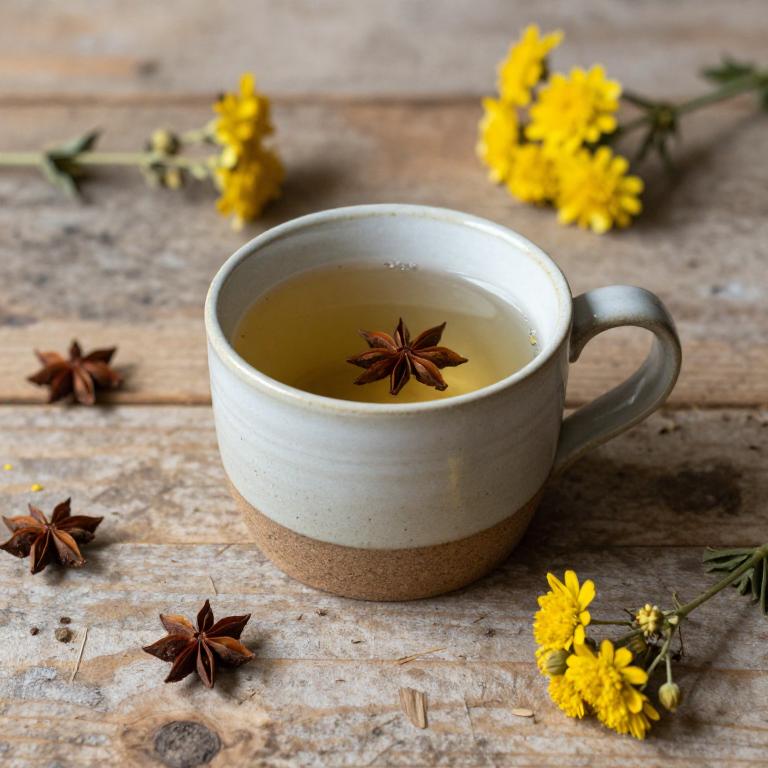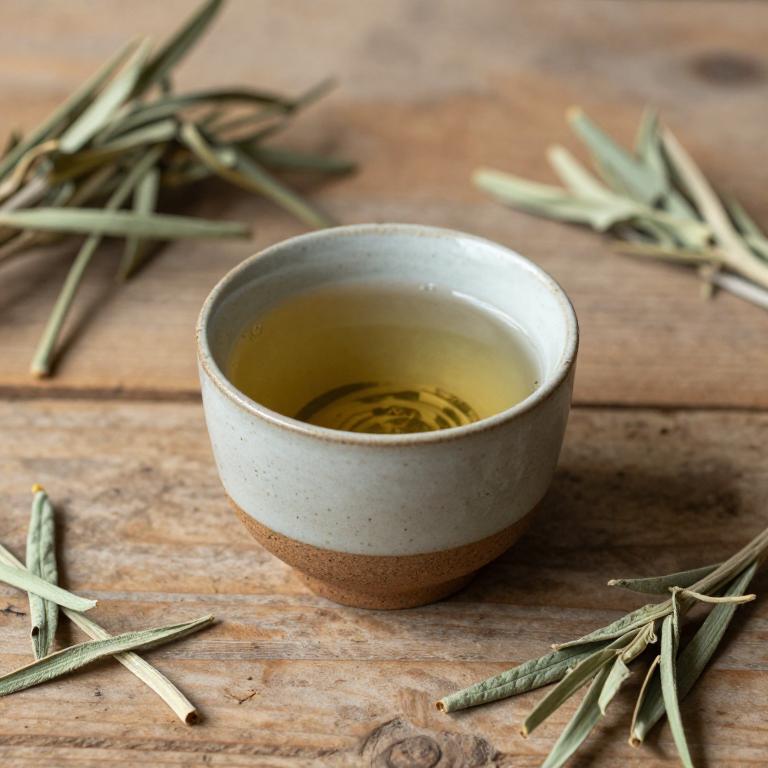10 Best Herbal Teas For Acid Reflux

Herbal teas can be a natural and effective remedy for acid reflux due to their soothing and anti-inflammatory properties.
Chamomile, ginger, and licorice root are commonly recommended herbs that help reduce stomach acid and ease digestive discomfort. These teas work by calming the digestive tract and promoting healthy digestion, which can minimize the occurrence of heartburn. However, it's important to consult with a healthcare provider before incorporating new herbal remedies, especially if you have underlying health conditions or are taking medications.
Overall, herbal teas offer a gentle and accessible option for managing acid reflux symptoms when used as part of a balanced diet and lifestyle.
Table of Contents
- 1. Camellia (Camellia sinensis)
- 2. Chamomile (Matricaria chamomilla)
- 3. Licorice (Glycyrrhiza glabra)
- 4. Ginger (Zingiber officinale)
- 5. Thistle (Silybum marianum)
- 6. Fennel (Foeniculum vulgare)
- 7. Cumin (Cuminum cyminum)
- 8. Anise (Pimpinella anisum)
- 9. Lemon grass (Cymbopogon citratus)
- 10. Chaste tree (Vitex agnus-castus)
1. Camellia (Camellia sinensis)

Camellia sinensis, the plant from which green and black teas are derived, contains bioactive compounds such as polyphenols and caffeine that can influence digestive health.
While moderate consumption of Camellia sinensis herbal teas may offer antioxidant and anti-inflammatory benefits, its impact on acid reflux varies depending on preparation and individual sensitivity. Some studies suggest that the caffeine in these teas can relax the lower esophageal sphincter, potentially worsening acid reflux symptoms. However, herbal teas made from Camellia sinensis, such as green tea, may be less acidic than traditional coffee or carbonated drinks, making them a potentially gentler option for some individuals.
It is advisable to consult a healthcare provider before incorporating Camellia sinensis teas into a diet if you have a history of acid reflux or other gastrointestinal conditions.
2. Chamomile (Matricaria chamomilla)

Matricaria chamomilla, commonly known as chamomile, is a popular herbal tea often used for its calming and digestive benefits.
It contains compounds like apigenin and bisabolol, which may help reduce inflammation and soothe the gastrointestinal tract. Some studies suggest that chamomile can alleviate symptoms of acid reflux by promoting the production of digestive enzymes and reducing stomach acid secretion. However, while it is generally considered safe for most people, it may interact with certain medications or cause allergic reactions in individuals sensitive to plants in the daisy family.
As with any herbal remedy, it is advisable to consult a healthcare provider before incorporating chamomile tea into a regular routine for acid reflux management.
3. Licorice (Glycyrrhiza glabra)

Glycyrrhiza glabra, commonly known as licorice root, is often used in herbal teas to alleviate symptoms of acid reflux due to its soothing and anti-inflammatory properties.
The active compounds in licorice root, such as glycyrrhizin and flavonoids, help to reduce stomach acid production and protect the lining of the esophagus. However, excessive consumption of licorice root tea may lead to side effects like increased blood pressure and fluid retention, so it should be used with caution. It is generally recommended to consult a healthcare provider before incorporating licorice root into a regular regimen for acid reflux.
While it can be a beneficial complementary remedy, it should not replace conventional medical treatments without professional guidance.
4. Ginger (Zingiber officinale)

Zingiber officinale, commonly known as ginger, is often used in herbal teas to help alleviate symptoms of acid reflux due to its natural anti-inflammatory and antispasmodic properties.
The active compounds in ginger, such as gingerol and shogaol, can help reduce stomach acidity and soothe the digestive tract, making it a popular remedy for heartburn and indigestion. However, while some studies suggest that ginger may help with digestion, it is important to note that it may not be suitable for everyone, especially those with a known sensitivity or allergy to ginger. When consumed in moderation, ginger tea can be a safe and effective complementary treatment for acid reflux, though it should not replace medical advice or prescribed treatments.
As with any herbal remedy, it is advisable to consult a healthcare professional before incorporating ginger into a regular health routine.
5. Thistle (Silybum marianum)

Silybum marianum, also known as milk thistle, is a herbal remedy that has been traditionally used for its potential health benefits, including support for liver function.
While it is not a primary treatment for acid reflux, some studies suggest that its anti-inflammatory and antioxidant properties may help reduce stomach irritation and lower the risk of acid reflux symptoms. However, it is important to note that silybum marianum is not a substitute for conventional treatments like proton pump inhibitors or H2 blockers. When considering herbal teas for acid reflux, it is advisable to consult with a healthcare professional to ensure safety and appropriateness for individual health conditions.
Overall, silybum marianum herbal tea may offer some supportive benefits but should be used cautiously and in conjunction with other recommended treatments.
6. Fennel (Foeniculum vulgare)

Foeniculum vulgare, commonly known as fennel, is often used in herbal teas to help alleviate symptoms of acid reflux due to its natural anti-inflammatory and antispasmodic properties.
The seeds of the fennel plant contain compounds like anethole, which can help relax the lower esophageal sphincter and reduce the frequency of acid reflux episodes. Fennel tea is generally considered safe for most people when consumed in moderation, though it may interact with certain medications or cause allergic reactions in some individuals. It is often recommended to drink fennel tea after meals or before bedtime to soothe the digestive system and minimize discomfort.
While it can be a useful complementary remedy, it should not replace professional medical advice or treatment for chronic acid reflux.
7. Cumin (Cuminum cyminum)

Cuminum cyminum, commonly known as cumin, is often used in herbal teas to support digestive health and alleviate symptoms of acid reflux.
The essential oils in cumin, such as limonene and cumin aldehyde, possess anti-inflammatory and carminative properties that can help reduce stomach irritation and excess gas. Drinking cumin tea regularly may promote the production of digestive enzymes, aiding in better digestion and reducing the likelihood of acid reflux episodes. However, while some studies suggest potential benefits, it is important to consult a healthcare professional before using cumin tea, especially for individuals with existing medical conditions or those taking medications.
Overall, cumin herbal tea can be a natural complement to a holistic approach in managing acid reflux when used as part of a balanced diet and lifestyle.
8. Anise (Pimpinella anisum)

Pimpinella anisum, commonly known as anise, is a popular herb used in herbal teas to support digestive health.
Its essential oils, particularly anethol, have been shown to relax the lower esophageal sphincter, which can help alleviate symptoms of acid reflux. Anise tea is often recommended for its soothing properties that may reduce heartburn and indigestion. However, it should be consumed in moderation, as excessive intake may cause gastrointestinal discomfort in some individuals.
As with any herbal remedy, it is advisable to consult a healthcare professional before incorporating anise tea into a regular regimen for acid reflux.
9. Lemon grass (Cymbopogon citratus)

Cymbopogon citratus, commonly known as lemon grass, is a popular herbal tea often used for its soothing and digestive properties.
This tea is believed to help alleviate symptoms of acid reflux due to its natural anti-inflammatory and antispasmodic effects. The essential oils in lemon grass, particularly citral and myrcene, may help reduce stomach acidity and relax the lower esophageal sphincter. While some studies suggest it may offer relief, more research is needed to confirm its efficacy for acid reflux.
As with any herbal remedy, it is advisable to consult a healthcare professional before incorporating it into a treatment plan.
10. Chaste tree (Vitex agnus-castus)

Vitex agnus-castus, also known as chasteberry, is a herbal remedy that has been traditionally used for various hormonal and digestive issues.
While it is commonly associated with regulating menstrual cycles and supporting hormonal balance, some people use it to alleviate symptoms of acid reflux due to its potential anti-inflammatory and soothing properties. However, it is important to note that scientific evidence specifically linking vitex to the relief of acid reflux is limited, and its effectiveness may vary among individuals. As with any herbal supplement, it should be used with caution and under the guidance of a healthcare professional, especially for those with existing digestive conditions.
Overall, while vitex may offer some supportive benefits, it should not replace conventional treatments for acid reflux without medical consultation.